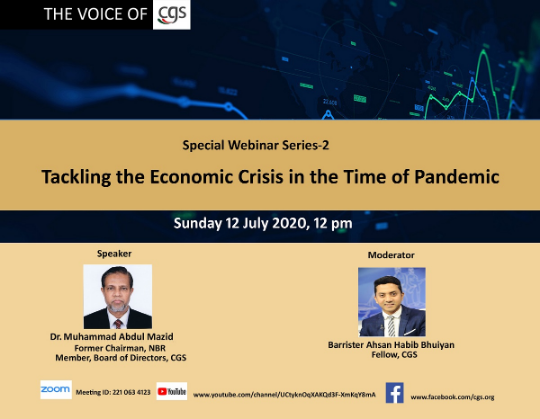Tackling the Economic Crisis in the Time of Pandemic
12 July 2020
The Centre for Governance Studies (CGS) is a non-profit independent think-tank. The Centre is established to address the challenges for Bangladesh in coping with the rapidly changing national and global scenarios. The Centre has closely been observing the changing situation during the pandemic and publishes COVID-19 related analyses and situation update. To discuss the current issues, the Centre has initiated a special webinar serious titled ‘The Voice of CGS’ where CGS’s scholars expressed their concerns and discussed the issues.
Under ‘The Voice of CGS’ special webinar series, the Centre organized a webinar titled “Talking the economic crisis in the time of pandemic” on Sunday, 12 July 2020. The webinar was started at 12:00 pm and it was ended at 1:30 pm. Dr. Mohammad Abdul Mazid, Member, Board of Directors of CGS and Former Chairman, National Board of Revenue (NBR), was the keynote speaker at the event.
In his statement, Dr. Mohammad Abdul Mazid expressed his concerns about the economic crisis during the pandemic situation. He said, “The world is in a severe crisis due to COVID-19, it has become the global disaster because of political conflicts around the world”. He mentioned a quotation from the famous writer Noam Chomsky, who was also infected by COVID-19, “Political Conflicts helps corona to spear the world, and this is not the end, it’s just a beginning we will be facing an environmental and ecological disaster very soon, we are in the 3rd stage of final destruction”. While talking about the COVID-19 situation in Bangladesh, he said, “we have had enough time but we did not take the advantage of the time to prepare ourselves for the pandemic”. “Bangladesh is one of the largest PPE exporter countries but we failed to supply this emergency equipment for our people at the beginning of this pandemic. Bangladesh failed to confront the corona pandemic institutionally; it has become the first country in the world to announce a general holiday instead of lockdown. That decision made the whole situation even more unpleasant”.
He added, “Bangladesh government has introduced many economical and tactical plans to tackle the overall situation, but they failed due to the lack of proper coordination and management. Bangladesh proposed few backup economical plans such as subsidiaries for small medium and large industries (SME’s), but there was a serious problem in distributing emergency response funds. SME and the informal sector did not get the proper support and attention from the government. He also added, “Bangladesh needs to adopt reformation policies for future development”. He wanted to consider our recent budget as an emergency budget rather than a regular budget because of the Corona situation and urged for more budgets in the health, education, and agriculture sectors. In the recent budget, we have seen only 5.2% of the total budget was allotted for the health sector. In this hazarded situation, Bangladesh needed to reallocate its budget for running projects based on priority, project expenditure, and quality. While answering a question on income tax, he explained, many things including political governance, prevent NRB to collect the estimated tax which creates a deficit in the annual income of the government and central budget. Finally, He recommended that the government should focus on transparency, honesty, good governance, and take advantage of the geopolitical location to overcome such a huge economic shock.
The Webinar was moderated by Ahsan Habib Bhuiyan, Fellow, CGS.
